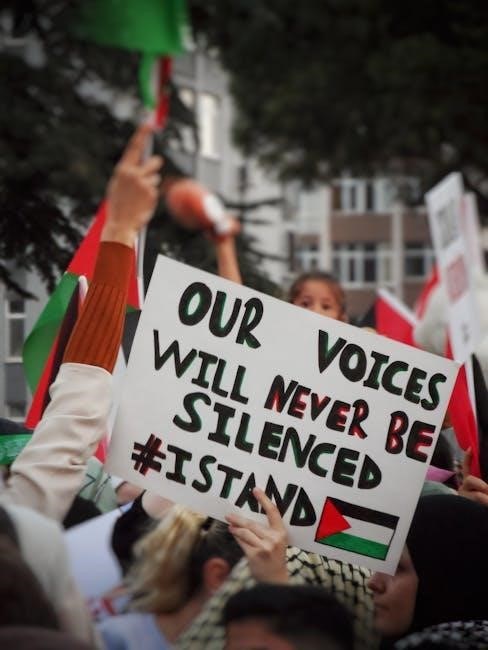The Hundred Years War on Palestine explores a century of colonial conflict‚ tracing the struggle for Palestinian sovereignty amid settler colonialism and global power interventions.
Overview of the Hundred Years War on Palestine
The Hundred Years War on Palestine‚ spanning from 1917 to 2017‚ examines the protracted conflict as a colonial war waged by the Zionist movement and later Israel‚ backed by Britain and the United States. Rashid Khalidi’s work draws on family archives‚ offering a personal and historical narrative of Palestinian resistance against settler colonialism. The book traces key events‚ including the Balfour Declaration and Nakba‚ highlighting Palestine’s struggle for sovereignty amidst global power dynamics. It challenges dominant narratives‚ presenting a comprehensive account of a century-long displacement and resilience.
Historical Context and Key Events
The Hundred Years War on Palestine begins with the 1899 letter by Theodor Herzl‚ marking the rise of Zionism. The 1917 Balfour Declaration‚ promising a Jewish homeland‚ ignored the Palestinian majority. This set the stage for a century of conflict. Key events include the 1948 Nakba‚ leading to mass displacement‚ and ongoing occupation. Khalidi’s analysis reveals how global powers like Britain and the U.S. supported Zionist goals‚ shaping the region’s fate. These events underscore the colonial nature of the conflict and its enduring impact on Palestinian nationalism and resistance.
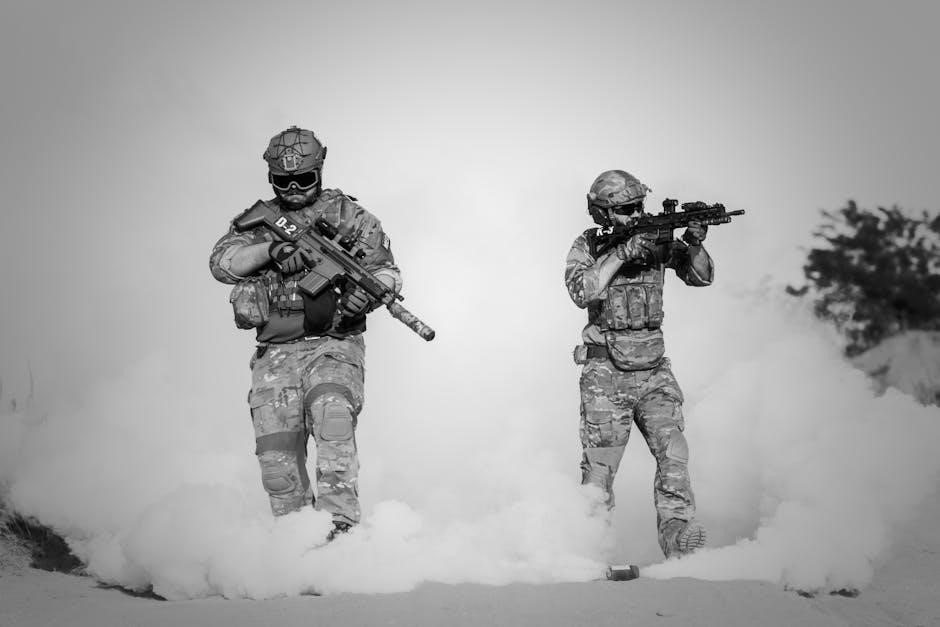
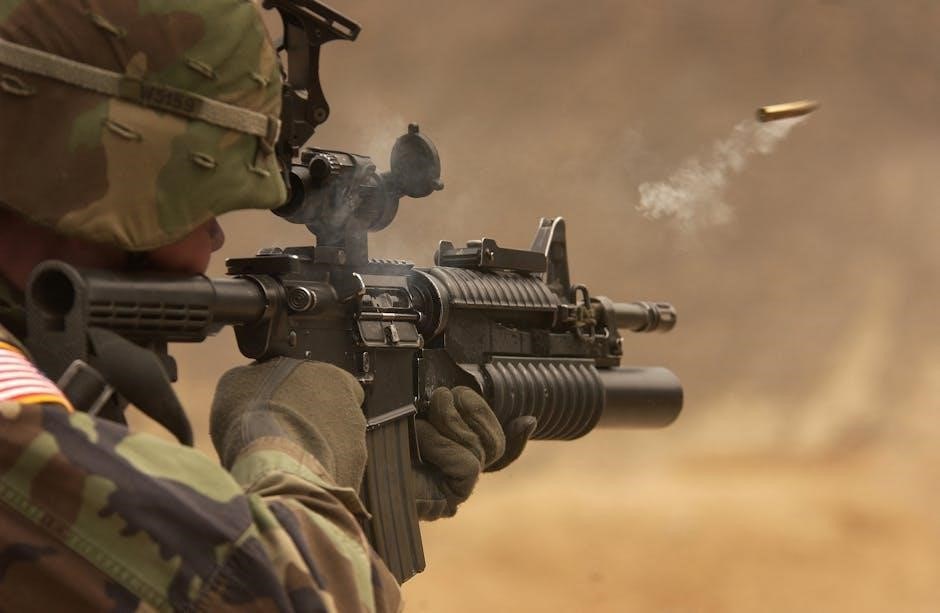
The Balfour Declaration of 1917
The Balfour Declaration was a pivotal moment‚ promising a Jewish homeland in Palestine while disregarding the rights of its indigenous population‚ setting the stage for prolonged conflict.
Impact on Palestinian Nationalism
The Balfour Declaration profoundly galvanized Palestinian nationalism‚ as it underscored the threat of dispossession. It eroded trust in British promises and catalyzed resistance‚ uniting Palestinians against Zionist expansion. The declaration became a rallying cry‚ fostering a collective identity and political mobilization. Palestinians rejected the denial of their rights‚ leading to widespread protests and the emergence of nationalist movements. This marked the beginning of a prolonged struggle for self-determination‚ as Palestinians sought to counter the imposition of a foreign homeland on their ancestral land‚ setting the stage for a century of conflict.
Zionist Movement and British Support
The Zionist movement gained momentum with British backing‚ as the Balfour Declaration legitimized its goals. Britain’s support enabled Jewish immigration and land acquisition‚ strengthening the Zionist presence in Palestine. This alliance facilitated the establishment of settlements and institutions‚ creating a foundation for a future state. However‚ British policies often prioritized imperial interests over local dynamics‚ exacerbating tensions with the Palestinian population. The collaboration between Zionists and Britain laid the groundwork for decades of conflict‚ as Palestinian displacement and resistance grew in response to expanding Zionist influence.
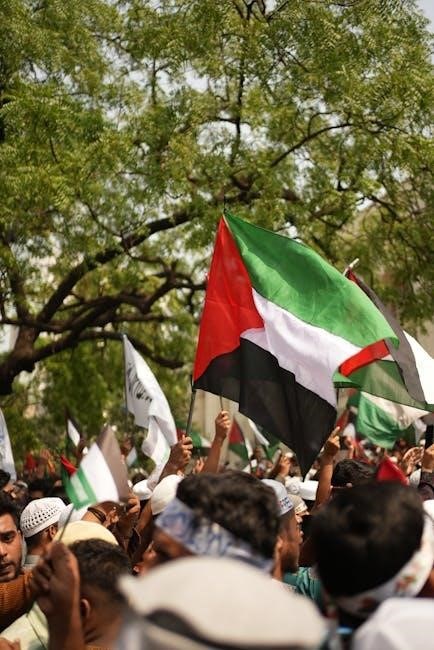
Settler Colonialism and Resistance
Zionist expansion led to Palestinian displacement‚ sparking resistance through political and armed struggle‚ shaping a century-long conflict over land‚ identity‚ and self-determination.
Early Zionist Settlements and Palestinian Response

The early Zionist settlements‚ beginning in the late 19th century‚ were met with growing Palestinian resistance. As Jewish immigration increased‚ tensions over land ownership and cultural identity intensified. Palestinians viewed these settlements as threats to their sovereignty‚ leading to localized protests and skirmishes. By the early 20th century‚ this resistance evolved into organized political movements‚ aiming to counter the growing Zionist presence. The British‚ who later controlled Palestine under a mandate‚ initially supported Zionist ambitions‚ further alienating the Palestinian population and setting the stage for prolonged conflict.
Military and Political Strategies of Resistance
Palestinian resistance employed a mix of military and political strategies to counter Zionist expansion and later Israeli occupation. Armed groups like the PLO and its factions‚ such as Fatah‚ engaged in guerrilla warfare and international campaigns to gain global support. Diplomatic efforts sought to highlight Palestinian rights‚ leveraging UN platforms and solidarity movements worldwide. These strategies aimed to challenge Israeli dominance while advocating for statehood and self-determination. Despite varying success‚ they kept the Palestinian cause alive‚ fostering resilience and unity among a displaced and occupied population.
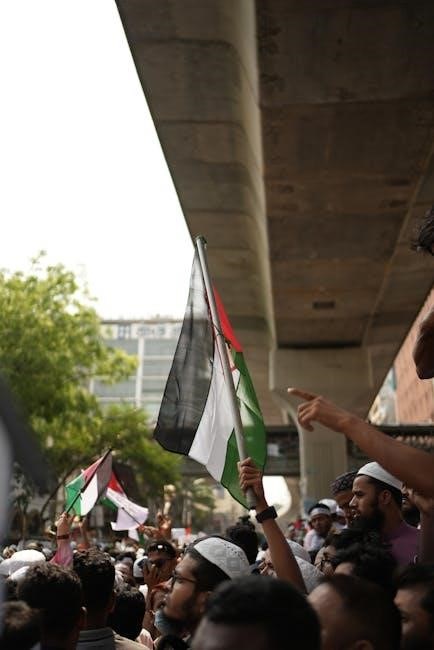
The Role of Great Powers
Great powers like Britain and the U.S. played pivotal roles‚ with Britain’s Balfour Declaration and American support for Zionism shaping the conflict’s trajectory and intensifying Palestinian dispossession.
British and American Involvement
British support for Zionism‚ epitomized by the 1917 Balfour Declaration‚ laid the groundwork for Jewish settlement in Palestine‚ undermining Palestinian self-determination. The United States later became a key backer of Israel‚ providing political‚ military‚ and financial aid that entrenched the occupation. This Anglo-American involvement not only shaped the conflict’s trajectory but also deepened Palestinian displacement and resistance. Their policies often disregarded Palestinian rights‚ perpetuating a cycle of violence and instability in the region. The legacy of these interventions continues to influence the modern dynamics of the Israeli-Palestinian conflict.
Global Politics and the Palestine Question
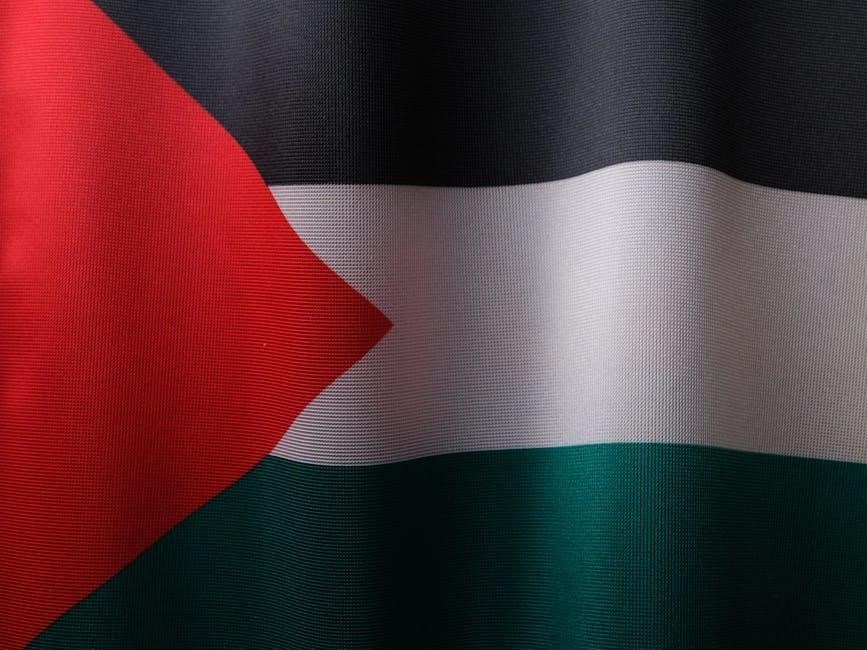
The Palestine question has long been entangled in global geopolitics‚ with international powers shaping its trajectory. The Cold War intensified external interventions‚ as the U.S. and Soviet Union backed opposing sides. Later‚ the rise of the European Union as a mediator introduced new dynamics‚ though its efforts often lacked coherence. International law and organizations like the United Nations play a pivotal role‚ yet their resolutions frequently go unenforced. Meanwhile‚ global solidarity movements have amplified Palestinian voices‚ leveraging social media and grassroots activism to counterbalance state power. The interplay of diplomacy‚ advocacy‚ and geopolitical rivalries continues to define the conflict’s international dimensions.
The Nakba and Its Aftermath
The Nakba‚ or “catastrophe” in Arabic‚ marks the 1948 Palestinian exodus‚ displacing hundreds of thousands‚ forever altering the demographic landscape and deepening the Palestinian refugee crisis.
1948 War and Palestinian Displacement
The 1948 Arab-Israeli War led to the displacement of hundreds of thousands of Palestinians‚ known as the Nakba or “catastrophe” in Arabic. This mass exodus resulted from military campaigns‚ forced expulsion‚ and fear of violence‚ reshaping the region’s demographics. Many Palestinians were unable to return to their homes‚ leading to a prolonged refugee crisis. The war’s aftermath saw the destruction of villages and the erasure of Palestinian communities‚ with survivors facing statelessness and poverty. This event remains a defining trauma in Palestinian history‚ with its impact still felt today in ongoing displacement and struggles for justice and recognition.
Long-term Consequences for Palestine
The Nakba’s aftermath left Palestine fragmented and its people scattered. The establishment of Israeli statehood in 1948 led to prolonged occupation and dispossession‚ with millions of Palestinians enduring statelessness and refugee status. The loss of land and sovereignty has hindered Palestinian self-determination‚ while ongoing military occupation and settlement expansion continue to undermine prospects for peace. The economic and social toll remains severe‚ with limited access to resources and infrastructure. These long-term consequences perpetuate a cycle of conflict and marginalization‚ shaping the modern Palestinian struggle for rights and justice in a deeply unequal landscape.
Modern Implications and Resistance
The ongoing Israeli-Palestinian conflict reflects unresolved colonial legacies‚ with modern resistance movements advocating for Palestinian rights and self-determination amid persistent global political and humanitarian challenges.
Continued Conflict and Occupation
The Israeli-Palestinian conflict persists as a defining issue in modern geopolitics. Ongoing occupation‚ settlement expansion‚ and military operations exacerbate tensions‚ displacing Palestinians and undermining peace efforts. Resistance movements‚ both violent and non-violent‚ continue to emerge‚ advocating for Palestinian rights and self-determination. The international community remains divided‚ with shifting alliances and policies further complicating the conflict. Despite periodic ceasefire agreements‚ the absence of a comprehensive solution perpetuates instability‚ rendering the quest for a two-state solution increasingly elusive. The enduring nature of this conflict underscores the deep-rooted historical and political complexities at play.
International Advocacy and Solidarity Movements
International advocacy and solidarity movements have played a crucial role in amplifying the Palestinian cause globally. Organizations and grassroots initiatives worldwide champion Palestinian rights‚ employing strategies like boycotts‚ divestments‚ and sanctions (BDS) to challenge Israeli policies. These efforts aim to counterbalance the political and economic influence of Israel’s allies‚ particularly the United States. Solidarity movements also highlight the humanitarian crisis in Gaza and the West Bank‚ advocating for justice and self-determination. Despite facing opposition‚ these movements have mobilized public opinion and inspired global activism‚ fostering a network of support for Palestine’s struggle against occupation and displacement.
The Hundred Years War on Palestine reflects a century of resilience and struggle‚ highlighting the enduring quest for justice and self-determination amid ongoing conflict.
Legacy of the Hundred Years War
Rashid Khalidi’s The Hundred Years War on Palestine offers a profound examination of a century of conflict‚ shedding light on the resilience of Palestinian identity and resistance. By drawing on family archives and historical events‚ Khalidi reclaims the narrative‚ emphasizing the human cost and political complexities. The book serves as a testament to the enduring struggle for justice and self-determination‚ providing a crucial historical context for understanding the ongoing Israeli-Palestinian conflict. Its legacy lies in its ability to educate and inspire‚ fostering solidarity and advocacy for Palestinian rights on a global scale.
Future Prospects for Palestine
The future of Palestine remains uncertain‚ yet hope persists through international advocacy and solidarity movements. Khalidi’s work underscores the importance of understanding history to shape a just future. Global efforts to recognize Palestinian rights and challenge settler colonialism are crucial. The book emphasizes the need for a unified strategy‚ combining diplomatic pressure and grassroots resistance. Education and awareness are key to countering narratives that erase Palestinian identity. By reclaiming their history‚ Palestinians continue to assert their right to self-determination‚ inspiring future generations to strive for peace and justice in the region.
